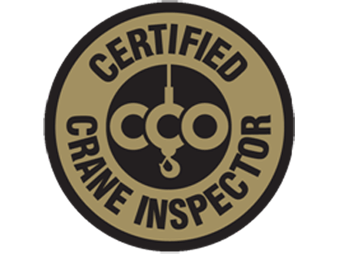 On November 1, CCO Crane Inspector Certification launched a new CCO national crane inspector certification program, developed jointly by the National Commission for the Certification of Crane Operators (NCCCO) and the Crane Certification Association of America (CCAA). The program provides for separate certifications for inspectors of mobile cranes, tower cranes, and overhead cranes.
On November 1, CCO Crane Inspector Certification launched a new CCO national crane inspector certification program, developed jointly by the National Commission for the Certification of Crane Operators (NCCCO) and the Crane Certification Association of America (CCAA). The program provides for separate certifications for inspectors of mobile cranes, tower cranes, and overhead cranes.
“NCCCO and CCAA mutually recognize the importance of safe crane operations and the role of certification in ensuring that personnel have the knowledge necessary to inspect and certify cranes,” said Ed Shapiro, president of HESCO (Niantic, CT) and chairman of CCAA. “This latest CCO certification will effectively ‘close the loop’ on jobsite lift safety by providing a way for crane inspectors to show that they are qualified to inspect cranes and be sure that cranes are safe for use.”
CCAA members from across the country—as well as NCCCO staff and volunteers from many industries that use cranes—participated in the forty-five-member Crane Inspector Task Force that developed the new program. Psychometric consultants from International Assessment Institute (IAI), the testing services company that has provided exam development and administration services to NCCCO since 1999, also played a key role in guiding the program development to make sure that the tests are fair, valid, reliable, and legally defensible.
The new program provides a means for those with at least five years of crane-related experience to earn a professional credential that demonstrates their qualification to inspect cranes. Before candidates take the rigorous written exams they must attest to their experience using detailed work history, education, and reference forms and submit proof (documentation, letters of recommendation, transcripts, résumé, etc.). NCCCO reviews each application and individually approves candidates before permitting them to apply to take the crane inspector exams.
The required five years’ experience includes duties such as crane inspector, crane operator, crane mechanic/technician, and crane shop foreman. Related education may be substituted for related experience at a ratio of two years of education for one year of experience up to three years. Related education includes courses in engineering, physics, applied mathematics, applied science courses in non-destructive testing, construction technology, and technical courses in heavy equipment mechanic/technician and/or welding technology.
The six content domains covered by the crane inspector certification tests are: (1) pre-inspection survey, (2) records review, (3) visual inspection, (4) operational testing, (5) load testing and load charts, and (6) post-inspection.
Candidates will also be required to pass the written portion of the respective CCO crane operator exam(s), although those who are currently CCO-certified operators will not need to retake those tests as long as their operator certification remains in good standing. While there is no practical exam, several written test items are pictorially based in order to test candidates on their observational skills.
“We expect that this new crane inspector certification will be popular with owners and employers who understand the safety and cost benefits of a professionally developed assessment process and who recognize its place within a comprehensive risk management process, while also meeting their obligations under state and federal requirements,” said NCCCO Program Manager, Joel Oliva. The new crane inspector certification will also show that inspectors are qualified to inspect cranes as required by OSHA 29 CFR 1926 Subpart CC, which states that cranes must be inspected after assembly, repair, jumping, and disassembly.
For more information about the new crane inspector certification program—including a candidate handbook, application, and experience forms—visit http://www.nccco.org/certification/craneinspector.html.











